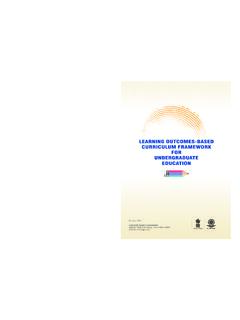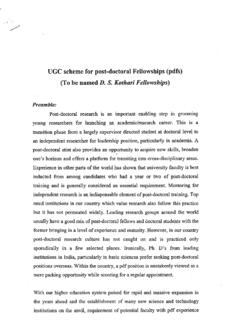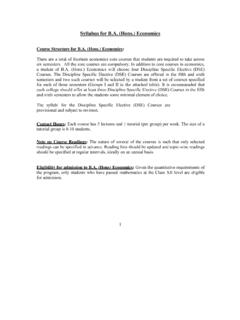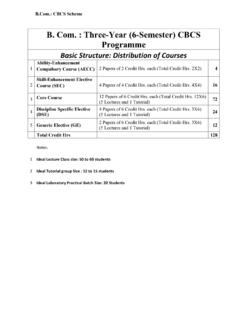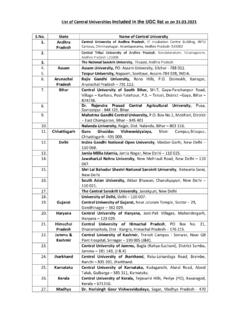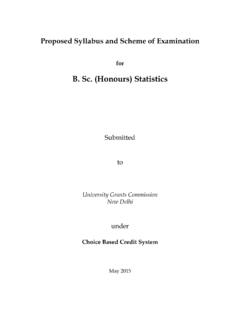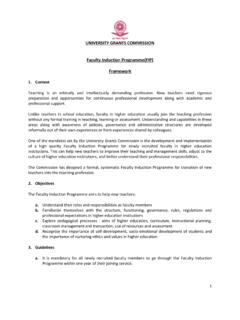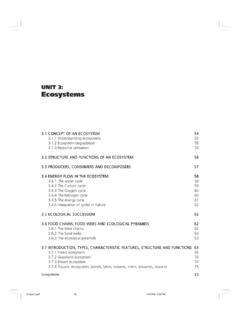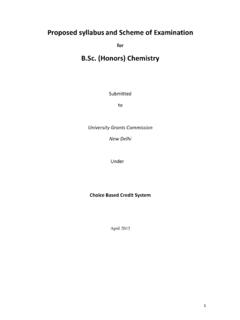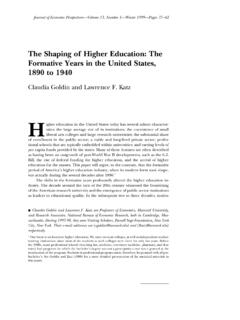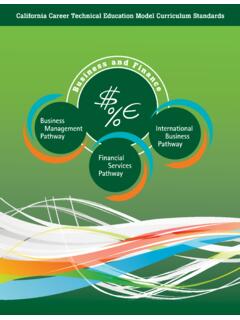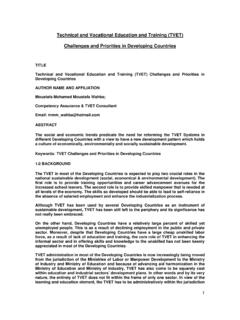Transcription of Guidelines for providing skill-based education under NSQF
1 1 University Grants Commission Guidelines for providing Skill Based education under National Skill Qualification Framework 1. Introduction Skills and knowledge are the driving forces of economic growth and social development for any country. Presently, the country faces a demand supply mismatch, as the economy needs more skilled workforce than that is available. In the higher education sphere, knowledge and skills are required for diverse forms of employment in the sector of education , health care manufacturing and other services. Potentially, the target group for skill development comprises all those in the labour force, including those entering the labour market for the first time, those employed in the organized sector and also those working in the unorganized sector.
2 Government of India, taking note of the requirement for skill development among students launched National Vocational education Qualification Framework (NVEQF) which was later on assimilated into National Skills Qualifications Framework (NSQF). Various Sector Skill Councils (SSCs) are developing Qualification Packs (QPs), National Occupational Standards (NOSs) and assessment mechanisms in their respective domains, in alignment with the needs of the industry. In view of this, the UGC implemented the scheme of Community Colleges from 2013-14 in pilot mode on the initiative of the MHRD. Thereafter, realizing the importance and the necessity for developing skills among students, and creating work ready manpower on large scale, the Commission decided to implement the scheme of Community Colleges as one of its independent schemes from the year 2014-15.
3 The Commission also launched another scheme of Degree programme to expand the scope of vocational education and also to provide vertical mobility to the students admitted into Community Colleges for Diploma programmes to a degree programme in the Universities and Colleges. While these two schemes were being implemented, it was also realized that there is a need to give further push to vocational education on a even larger scale. Accordingly, Deen Dayal Upadhyay Centres for Knowledge Acquisition and Upgradation of Skilled Human Abilities and Livelihood (KAUSHAL) was also incorporated.
4 Since all these three provisions serve a common purpose, all these schemes are merged into a single scheme for providing skill based education under National Qualification Framework. 2 2. National Skill Qualification Framework The National Skills Qualifications Framework (NSQF) is a competency-based framework that organizes qualifications according to a series of knowledge, skills and aptitude. The NSQF levels, graded from one to ten, are defined in terms of learning outcomes which the learner must possess regardless of whether they are obtained through formal, non-formal or informal learning. National Occupational Standards (NOS) are statements of the skills, knowledge and understanding needed for effective performance in a job role and are expressed as outcomes of competent performance.
5 They list down what an individual performing that task should know and also are able to do. These standards can form the benchmarks for various education and training programs to match with the job requirements. Just as each job role may require the performance of a number of tasks, the combination of NOSs corresponding to these tasks form the Qualification Pack (QP) for that job role. The NOSs and QPs for each job role corresponding to each level of the NSQF are being formulated by the respective Sector Skill Councils (SSCs) set up by National Skill Development Corporation (NSDC) with industry leadership.
6 The curriculum which is based on NOSs and QPs would thus automatically comply to NSQF. The specific outcomes expected from implementation of NSQF are as follows: a) Mobility between vocational and general education by alignment of degrees with NSQF b) Recognition of Prior Learning (RPL), allowing transition from non-formal to organized job market c) Standardized, consistent, nationally acceptable outcomes of training across the country through a national quality assurance framework d) Global mobility of skilled workforce from India, through international equivalence of NSQF. e) Mapping of progression pathways within sectors and cross-sectorally f) Approval of NOS/QPs as national standards for skill training 3 3.
7 Type of Courses and Awards: There will be full time credit-based modular programmes, wherein banking of credits for skill and general education components shall be permitted so as to enable multiple exit and entry. The multiple entry and exit enables the learner to seek employment after any level of Award and join back as and when feasible to upgrade qualifications / skill competencies either to move higher in the job profile or in the higher educational system. This will also provide the learner an opportunity for vertical mobility to second year of degree programme after one year diploma and to third year of degree programme after a two year advanced diploma.
8 The students may further move to Masters and Research degree programmes mapped at NSQF Level 8 10. 4. Curricula and Credit System for Skill Based Courses In order to make education more relevant and to create industry fit skilled workforce, the institutions recognized under Community Colleges, Degree programme and Deen Dayal Upadhyay KAUSHAL Kendras offering skill based courses will have to be in constant dialogue with the industry and respective Sector Skill Council(s) so that they remain updated on the requirements of the workforce for the local economy. These institutions should also 4 preserve and promote the cultural heritage of the region, be it art, craft, handicraft, music, architecture or any such thing, through appropriately designed curriculum leading to gainful employment including self-employment and entrepreneurship development.
9 The curriculum in each of the semester/years of the programme(s) will be a suitable mix of general education and skill development components. The General education Component shall have 40% of the total credits and balance 60% credits shall be of Skill Component. The institution(s) shall prepare draft curriculum as per the UGC Guidelines for Curricular Aspects Assessment Criteria and Credit System for Skill based Vocational Courses and place it for vetting by the UGC Advisory Committee constituted under these Guidelines (vide para ). The Curriculum shall be finally approved by the Board of Studies (BoS) and Academic Council of the University / Autonomous College.
10 The Universities where BoS for Vocational subjects has not yet been constituted, the curriculum may be considered by the BoS in allied subject area or an ad-hoc BoS may be constituted till the time regular BoS is notified in the university. The BoS should consider the programme wise curriculum based QP for skill component and relevant general education subjects the curricula for programmes in one broad subject area may vary from institution to institution in case the different progressive QPs are mapped with the programmes being offered. The choice of different progressive Job roles for a course may also be enabled under CBCS.

